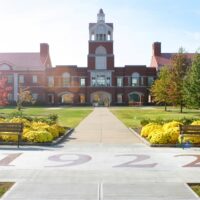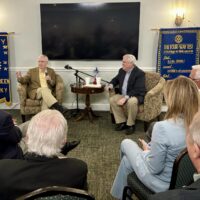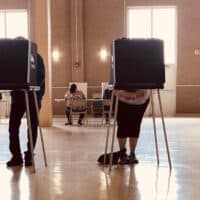Gov. Andy Beshear hit on a range of topics Wednesday that included efforts to allow some child care in the next phase of reopening the economy, an adjusted out-of-state travel ban, and his drumbeat that relaxation of restrictions to fight the coronavirus doesn’t mean that you shouldn’t still strive to be “healthy at home.”

“It is very important that as we talk about healthy-at-work and more opportunity, that we realize that we still need to keep our contacts as low as possible and the more that we are going to work and seeing other people there, the more we need to just come home afterwards,” Beshear said at his daily briefing.
One of the greatest challenges for many who are being asked to go back to work is what to do with their children, since day-care centers are not allowed to open in the first major phase of re-opening that begins Monday. Last week, Beshear showed charts to illustrate how reopening them would greatly increase the number of contacts each person would have, thereby increasing the risk of spreading of the virus.
Beshear said yesterday that unemployed people who can’t find child care won’t be required to follow an employer’s call to return to work.I
Asked if summer camps, which are often used for child care, would be allowed to open in June, he said they could not, but optimistically said maybe they could later in the summer, depending on how the virus goes.
“What we are working on in June, right now, is trying to find a child-care option that works,” he said. “Looking over at other states, most of them are either where we are, only for essential workers, or have been able to open up to a very limited amount of kids, and so we are working on that possibility right now.”
He said he hopes to announce a plan Friday for the reopening of restaurants, gyms, and movies, and “We’re trying to find a child-care option.”
Tuesday, a federal judge ruled that Beshear’s ban on out-of-state travel was not legal. Today the governor said he had issued a new order that mimics Ohio’s ban, which the judge said was legal.
The new order continues to ban anyone with a positive or preemptively positive case of COVID-19 from entering Kentucky, unless ordered for medical treatment. It also keeps in place requirements of social distancing on public transportation, and a rule that people arriving in Kentucky to stay are asked to self-quarantine for 14 days.
“Basically, the court said, ‘We think Ohio’s is fine. We think yours should be more like Ohio’s’,” Beshear said. “So we’ve issued one today that’s exactly like Ohio’s. That’s what the court says will work; that’s what we’ll do.”
Health Commissioner Dr. Steven Stack noted that the second phase of health-care reopening has started, allowing outpatient and ambulatory surgeries and invasive procedures under strict guidelines.
Stack also stressed that just because Kentucky is beginning to relax some requirements, that does not mean it is safe for those highest at risk, including those who are over 60 or have chronic health conditions.
“All the statistics we have show that for people who are over 60, this is a bad disease and you are at highest risk,” he said. “If you are in a vulnerable category, over 60 or have major medical problems, you have to pay particular attention to following all of these requirements, because as people begin to engage a bit more in society, as we try to find ways to relax restrictions, you have to take special safeguards to keep yourself safe.”
The Lexington Herald-Leader reports that through May 5, about 28 percent of people older than 80 who had contracted the virus had died from it. For those in their 70s, the fatality rate is around 13%; for people in their 60s it is about 7%.





